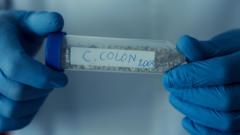After over two decades of investigation, a team of scientists led by Professor José Antonio Lorente from Granada University is set to unveil findings on the true origins of the iconic navigator, Christopher Columbus. Despite historical assurances that Columbus hailed from Genoa, his birthplace has been a topic of debate for centuries, with numerous regions staking their claim to his legacy.
In 2003, Lorente and historian Marcial Castro extracted DNA samples from Columbus, his son Hernando, and brother Diego's remains at Seville Cathedral. By comparing these samples to those from historical figures across various countries, including Spain, Portugal, and Italy, the team sought to pinpoint Columbus's roots using advanced technologies to ensure accuracy.
Although much contention surrounds the explorer's resting place, with the Dominican Republic maintaining a claim, Lorente's team confirmed the Seville remains belong to Columbus. However, the mystery of his birthplace persists.
The conventional belief is that Columbus was born in 1451 in Genoa. Yet, the researchers have identified eight potential birthplaces spread across Spain, Portugal, and Italy, narrowing the mystery. Speculations include his ties to regions in Spain as well as theories of noble origin or Jewish ancestry, aimed at explaining his elusive early years.
RTVE, Spain’s national broadcaster, promises revelations that could alter historical perspectives in their upcoming documentary, “Colón ADN. Su verdadero origen,” scheduled for Saturday at 22:30 (20:30GMT). While details of Columbus's exact birthplace remain under wraps, Marcial Castro remarks the Genovese theory is historically favorable, hinting that forthcoming analysis may soon settle this age-old debate.
In 2003, Lorente and historian Marcial Castro extracted DNA samples from Columbus, his son Hernando, and brother Diego's remains at Seville Cathedral. By comparing these samples to those from historical figures across various countries, including Spain, Portugal, and Italy, the team sought to pinpoint Columbus's roots using advanced technologies to ensure accuracy.
Although much contention surrounds the explorer's resting place, with the Dominican Republic maintaining a claim, Lorente's team confirmed the Seville remains belong to Columbus. However, the mystery of his birthplace persists.
The conventional belief is that Columbus was born in 1451 in Genoa. Yet, the researchers have identified eight potential birthplaces spread across Spain, Portugal, and Italy, narrowing the mystery. Speculations include his ties to regions in Spain as well as theories of noble origin or Jewish ancestry, aimed at explaining his elusive early years.
RTVE, Spain’s national broadcaster, promises revelations that could alter historical perspectives in their upcoming documentary, “Colón ADN. Su verdadero origen,” scheduled for Saturday at 22:30 (20:30GMT). While details of Columbus's exact birthplace remain under wraps, Marcial Castro remarks the Genovese theory is historically favorable, hinting that forthcoming analysis may soon settle this age-old debate.



















